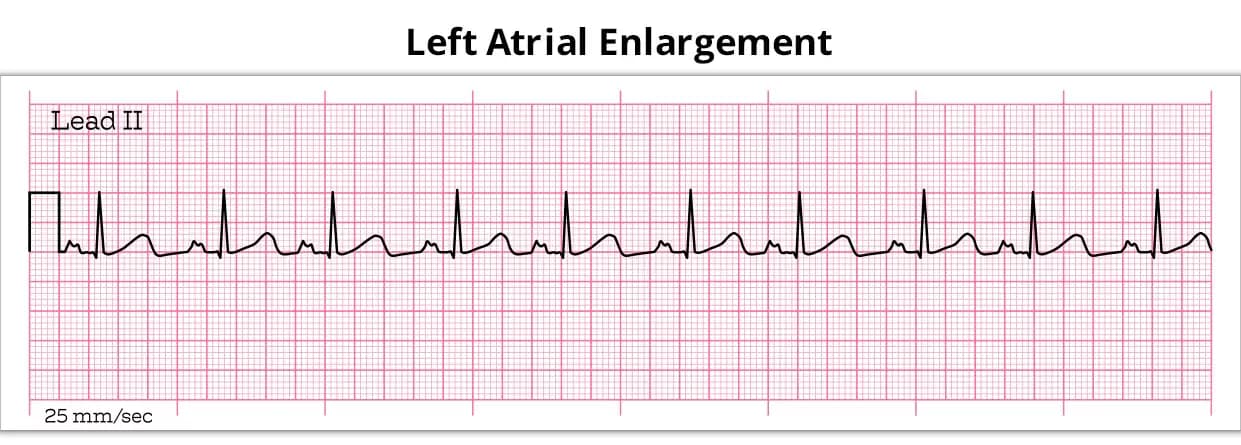
Left atrial enlargement is referred to as one of the heart chambers in the human body. It is a condition that occurs when heart chambers get bigger than their usual size. It takes place when the left atrium is trying to adjust to problems like blood pressure. Sometimes, people might come across a problem with their left ventricle pumping blood to the aorta. Some individuals might have some issues with the mitral valve allowing the blood to move between their left atrium and left ventricle.
Left atrial enlargement is one of the most common conditions affecting a large proportion of the world's population. According to studies, the prevalence of this condition appears to be rising along with conditions like hypertension and age-related heart diseases. However, precise numbers may differ between populations but this cardiac anomaly is commonly acknowledged as a frequent occurrence. Left atrial enlargement is a result of several factors, such as age, hypertension, coronary artery disease, valvular heart disease, and specific genetic vulnerability.
If you suffer from any form of heart condition, make sure to book your appointment with one of the best cardiologists in Kolkata at BM Birla Heart Research Center to rule out the left atrium. You will discover comprehensive services ranging from advanced diagnostics to cutting-edge treatments, ensuring optimal heart health and well-being for every patient.
Additionally, in this blog, we will demystify this prevalent condition, explaining who it affects and why. However, please note that this article is for informational purposes and does not replace the significance of a cardiologist's consultation.
Left atrial enlargement is a condition that occurs when the left atrium of the heart enlarges more than usual. This enlargement frequently happens in response to underlying cardiac conditions such as heart failure, valvular diseases, or hypertension. The enlargement of the left atrium may impair the heart's capacity to pump blood effectively, resulting in symptoms such as palpitations, exhaustion, and dyspnea.
Echocardiography and other imaging tests are commonly involved in diagnosis to show the enlarged left atrium. To prevent complications and improve heart health, left atrial enlargement must be identified and treated at the earliest.
Left atrial enlargement affects people who are suffering from conditions such as high blood pressure, coronary artery disease, mitral valve pressure, aortic valve disease, certain forms of cardiomyopathy, diastolic dysfunction, left ventricular hypertrophy, and congenital heart disease.
Although the symptoms are not directly related to the condition, they can be experienced as symptoms of the condition that is causing it. Here are the following left atrial enlargement symptoms:
Many underlying factors cause left atrial enlargement, and each one of them contributes to the left atrium's expansion:
An electrocardiogram or EKG/ECG, is involved by the physician to begin the diagnostic process. One of the symptoms of left atrial enlargement on an ECG is an uncommon "P wave." If a person has this condition, a longer-than-usual atria contraction is indicated by the P wave.
A transthoracic echocardiogram, cardiac CT scan, and heart magnetic resonance imaging (MRI) are additional tests that a doctor may order to confirm the diagnosis of the left atrial enlargement.
There is no specific treatment available for the left atrial enlargement if it lasts longer than a week. Even so, there are options for left atrial enlargement treatment that one can incorporate into their daily routine such as:
Left atrial enlargement is a serious cardiac disease that has a wide range of effects on heart health. Its causes, symptoms, and possible complications have been discussed, highlighting how crucial early detection and proactive management are. People can take charge of their heart health and pave the way for a healthier, happier future by learning the factors that contribute to left atrial enlargement and implementing lifestyle changes including effective treatment plans to reduce the severity of symptoms.
Left atrial enlargement is an indication of problems linked to the heart’s upper chamber handling excessive blood and high pressure.
The underlying cause of left atrial enlargement and the existence of other cardiovascular disorders influence the prognosis for affected individuals. Many people can lead long, happy lives with the right care and lifestyle adjustments.
This is not a serious issue, but an indication of a serious problem. If an individual is suffering from the condition, it is crucial to discover the root cause and get treatment on time. It can cause dangerous health concerns in the future if no treatment is considered for the underlying cause.
At present, no cure is available for the left atrial enlargement and it cannot be reversed as well. The doctor will recommend the treatment for every particular cause to ease the symptoms.
Yes, you can exercise with left atrial enlargement. You don’t have to feel concerned about the condition but make sure to avert from the heavy exercises.
Stress can aggravate underlying cardiovascular conditions like hypertension and heart disease, which are common contributors to left atrial enlargement. Hence, reducing stress and modifying one's lifestyle can help lessen its negative effects on heart health.
Written and Verified by:

Dr. Rakesh Sarkar is a Senior Consultant in Cardiology & Electrophysiology at BM Birla Heart Hospital, Kolkata, with over 11 years of experience. He specializes in complex arrhythmia management, including atrial fibrillation, ventricular tachycardia, CRT-D, and conduction system pacing.
Similar Cardiology Blogs
Book Your Appointment TODAY
© 2024 BMB Kolkata. All Rights Reserved.